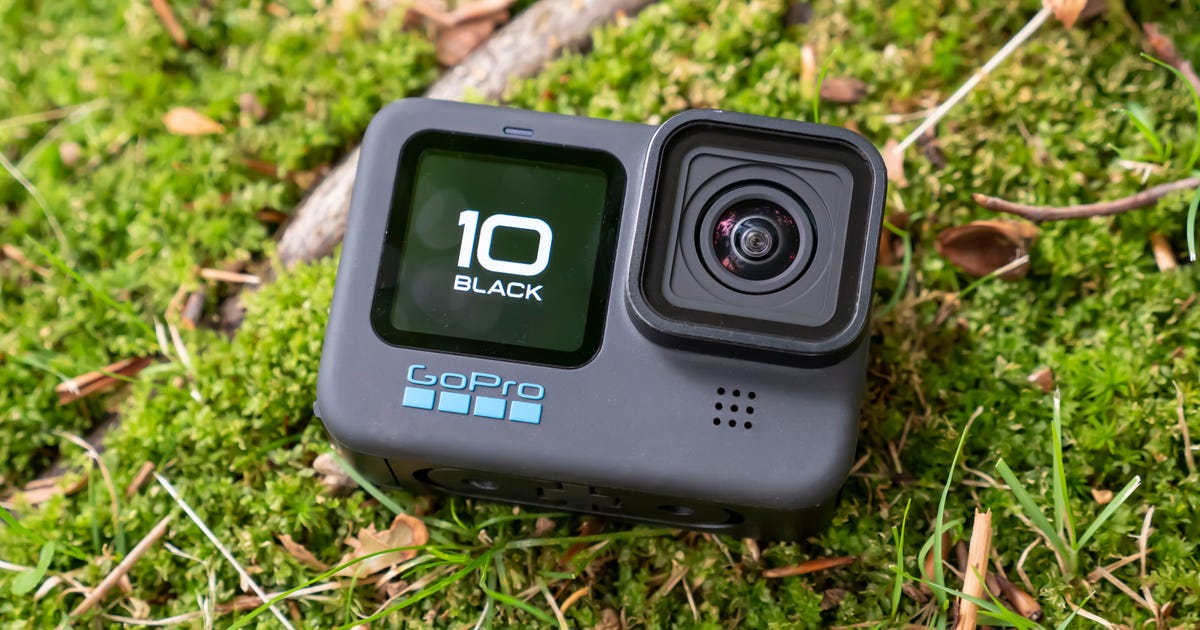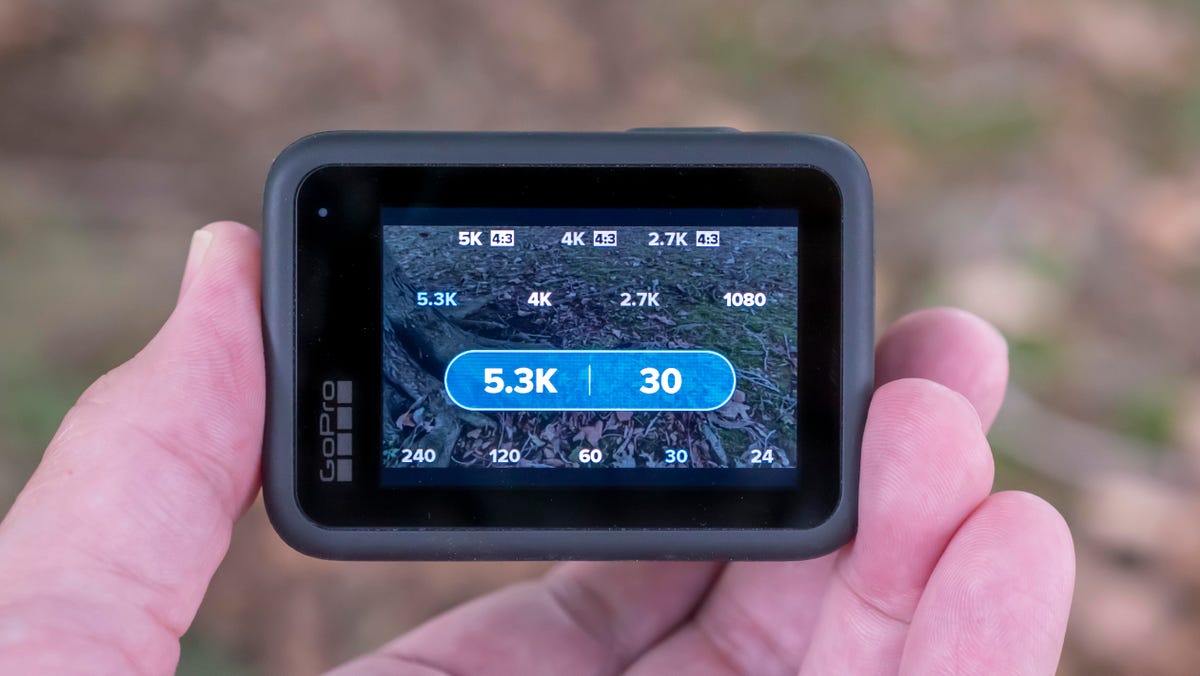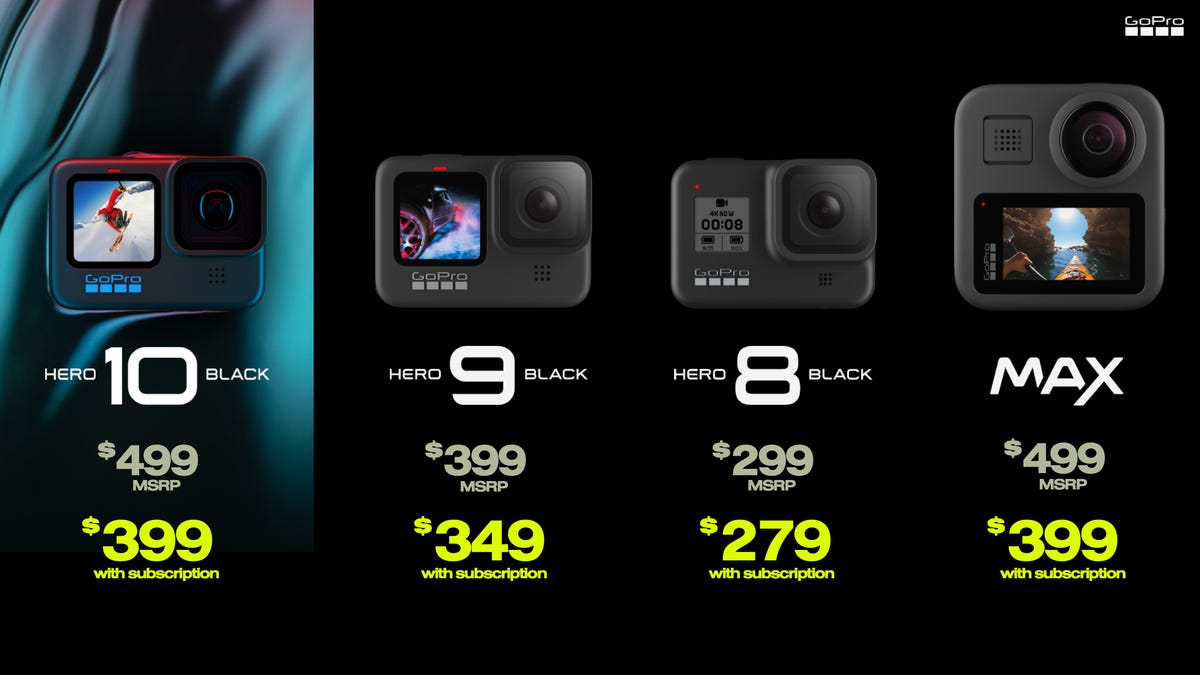GoPro Hero 10 Black Review: Pushing Boundaries Once Again

GoPro Hero 10 Black review: Pushing boundaries once again
Starting with the Hero 6 Black in 2017, GoPro switched to using its own custom processors in its cameras. The Hero 6 wasn't a complete overhaul from the Hero 5 Black, but the processor, the GP1, allowed GoPro to push the camera's resolution, frame rates and image stabilization to greater heights, which continued straight through to last year's fantastic Hero 9 Black. GoPro seemingly hit the ceiling on what the GP1 could do so, for the Hero 10 Black, it's on to the GP2.
A processor upgrade in and of itself isn't going to be too exciting for most people. It's what the GP2 can do or, more to the point, what you'll be able to do with the Hero 10 because of the GP2 that's exciting. Let's start with resolutions and frame rates. With the Hero 10 Black you'll be able to shoot video at:
- 5.3K (5,312 x2,988 pixels) at 30 or 60 frames per second
- 4K at 24, 30, 60 or 120fps
- 2.7K at 60, 120 or 240fps
- 1080p at 30, 60, 120 or 240fps

The Hero 10 has a wide range of resolutions and frame rates.
Josh Goldman/CNETGoPro also includes the option to shoot in 5K (30 or 60fps), 4K (60fps) and 2.7K (60 or 120fps) with a 4:3 aspect ratio. Why would you want that instead of 16:9? The taller frame lets you capture more vertically but also with such a high resolution, you can pull frames from the video for 19.6-megapixel photos from 5K 4:3 video. Frames from the 5.3K video will be 15.8 megapixels. You can just shoot photos, too, at 23 megapixels in JPEG or raw.
With the Hero 9, I started shooting a lot more 4K video but I really wanted to shoot at 120fps. WIth the Hero 10, you can do that and the results are excellent. It's not great for battery life, and neither is the 5.3K at 60fps. But being able to slow down the action is worth it. My clips are rarely longer than a minute or two (GoPro says 50% of videos shot on its cameras are less than 25 seconds) and I was able to capture quite a lot with two battery packs recording at 5K30.
Does the GoPro Hero 10 Black overheat?
The camera does get warm while recording at 5K and 4K120. I didn't experience any overheating but, again, my clips are rarely longer than 2 minutes and I don't leave both displays on all the time while recording. If you used its top settings in warm or hot weather and you kept the camera stationary, I'm sure it's possible to get the Hero 10 to shut down or lock up. Shooting short clips will help keep the camera from getting too hot while recording.
One other piece of advice: You might have to upgrade your microSD card if you're moving up from an older GoPro camera. When I started testing, I used a Samsung Evo Select card that I regularly used in the Hero 9 Black without issue. While I initially had no problems with it in the Hero 10, when I started recording at 5.3K60 I got a warning that my card was too slow and I'd need a faster card -- V30 or higher -- to maximize performance. I tested again with a Samsung Pro Plus microSD card, a fast and affordable option at about $30 for a 128GB capacity, and it worked perfectly without fail.

The Hero 10 uses the same battery as the Hero 9.
Josh Goldman/CNETEven smoother stabilization at all resolutions
HyperSmooth 4.0 is GoPro's name for its highest level of image stabilization in the Hero 10 Black. It's available at 5.3K30, 4K60 and 2.7K120, though there is stabilization at other resolutions and frame rates, too. I tested the stabilization out on some theme park rides, at a water park, biking and just walking around and the results were nothing short of stellar.
HyperSmooth 4.0 also gives you horizon leveling with a tilt limit up to 45 degrees; it's a maximum of 27 degrees in the Hero 9. Stabilization is available when you're livestreaming with the Hero 10, too, which is great if you're doing something like walking and talking with it.
Video in 5.3K is sharp and detailed, even in the mixed indoor-outdoor lighting in the theme and water parks. It records at a relatively high bit rate of 60 megabits per second. GoPro says you should see improvements in low-light outdoors scenes and at dusk and sunset, but low-light video indoors was soft and noisy. That's not unusual from a small 23.6-megapixel sensor, though.
Same tools, same design

The Hero 10 has a new hydrophobic lens cover.
Josh Goldman/CNETOther than the faster frame rates and higher resolutions -- and the processor that makes them possible -- the bulk of the Hero 10 Black is the same as the Hero 9 Black. The design is the same except for the bright blue branding. The battery is the same, the lens mount is the same and the front display and rear touchscreen are the same size. It'll work with all of the add-on Mods GoPro made for the Hero 9 like the Media Mod that gives you a shotgun mic, an HDMI out, a 3.5mm mic jack and a couple of cold shoes, and the Max Lens Mod which reproduces an ultrawide-angle lens found on the GoPro Max 360-degree camera (although support won't be available for it until later in 2021).
GoPro did upgrade the lens cover and now uses hydrophobic water-shedding glass. For years I've been told the best way to keep water off your GoPro lens is to lick the lens. Well those days are over because this lens cover works really well. I've had a number of clips ruined by a single water drop on the lens and it just didn't happen with the Hero 10. It won't get rid of it 100% of the time, but the water did seem to shed extremely fast. And since the Hero 10 has the same lens mount as the Hero 9, you can get one for $20 to use on the Hero 9.

The live preview on the front display is smoother thanks to the GP2 processor.
Josh Goldman/CNETAll of the video tools GoPro added with the Hero 9 are here in the Hero 10, too. Things like Schedule and Duration captures and Hindsight, which stores a video buffer so you don't miss anything before you hit record, are all carried over. Check out my video for the Hero 9 to learn more about those.
Basically, compared to the Hero 9 Black, the Hero 10 Black has a photo resolution up to 23 megapixels (up from 20), video resolution up to 5.3K at 60fps and 4K at 120fps and HyperSmooth 4.0 image stabilization. There are a few other improvements like a smoother live preview experience on the front screen and better touchscreen sensitivity on back, and you can now use a USB-C cable to transfer content to your phone.

The Hero 10 is waterproof to 10 meters and has built-in, flip-down fingers for mounting.
Josh Goldman/CNETShould I upgrade to the GoPro Hero 10 Black?
As with the Hero 9 Black, pricing is a little confusing for the Hero 10 Black. The camera is $499, which is $50 more than the Hero 9's starting price. However, if you buy direct from GoPro.com and sign up for the GoPro subscription service -- which is included with the camera -- GoPro knocks $100 off, so it's $399. In Australia, the camera with a one-year GoPro subscription will retail for AU$599, and for £379 in the UK. Without the subscription, the camera retails for AU$749 and £479.
The subscription service gives you unlimited cloud backups at original quality, damaged camera replacement, discounts on GoPro accessories and gear and access to GoPro's premium live streaming platform. I've been using it just for the wireless backups because it makes sharing clips and photos easier. When you plug in the camera to charge, it automatically connects to your Wi-Fi network -- once you've set it up with the iOS or Android mobile app -- and it starts to back up.

Again, a year subscription is included and lowers the price of the camera by $100. After a year, if you like the service and decide to keep it, it's $50 annually or $5 per month. In Australia, it's AU$70 annually or AU$7 a month; in the UK, it's £50 annually or £4.17 a month.
The Hero 9 and Hero 8 will stay in the lineup, along with the GoPro Max 360 camera; each of those gets a price reduction, too, if you buy from GoPro.com and sign up for the included service.
I've been waiting for stabilized 4K120 video capture on a GoPro and it's definitely nice to have. I regularly use the Hero 9's 5K video for easily capturing stills, so it's nice to have the extra resolution on the Hero 10 for that as well. If you already have a Hero 9 Black, though, you wouldn't be missing out on too much if you wait a year to see what else GoPro can do with the new GP2 processor. The Hero 9 is a good place to start if you're new to GoPro cameras, too. If you've got a Hero 7 Black or Hero 8 Black, this might be a good time to upgrade because you'll be getting a lot of new features and capabilities and a better design.
Source
